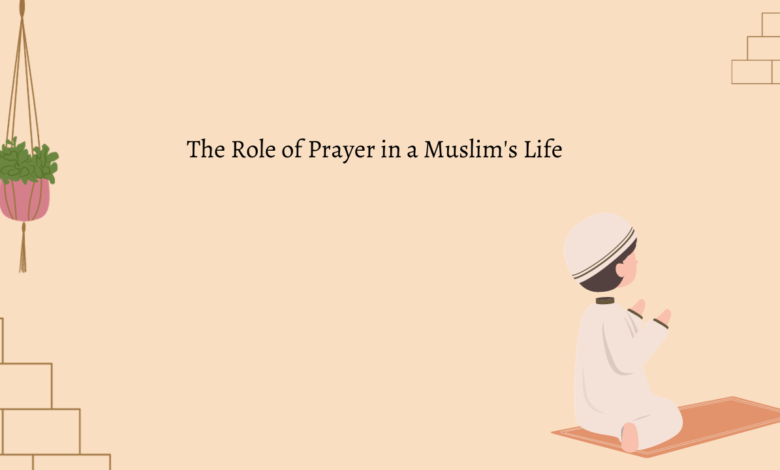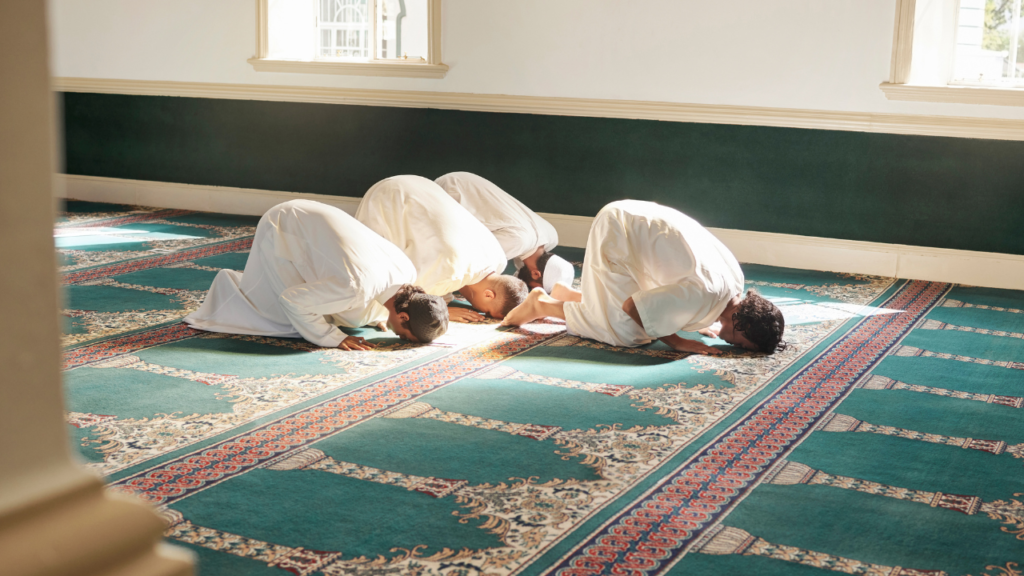
The Role of Prayer in a Muslim’s Life
Prayer, or Salah, is one of the Five Pillars of Islam and holds great importance. It is a direct means of communication between a Muslim and Allah (God). It serves as a way to strengthen faith, seek guidance, and maintain a connection with the divine.

Introduction
Prayer is a fundamental and deeply cherished aspect of the Islamic faith. It serves as a means of communication with Allah (God) and holds a central role in the daily life of a Muslim. Muslims around the world engage in ritual prayers, also known as Salah or Salat, to connect with their Creator, seek guidance, and find spiritual solace. This article explores the significance of prayer in a Muslim’s life, both as a religious obligation and as a source of inner peace and spiritual growth.
The Five Daily Prayers:
Muslims are required to perform five daily prayers at specific times throughout the day and night. These prayers are Fajr (before dawn), Dhuhr (midday), Asr (afternoon), Maghrib (just after sunset), and Isha (night). These prescribed times ensure that a Muslim’s day is punctuated with moments of reflection and connection to Allah.
Spiritual Connection:
Prayer is the cornerstone of a Muslim’s spiritual connection. Through Salah, Muslims seek to establish a direct line of communication with Allah. They recite verses from the Quran and engage in physical postures, such as bowing and prostration, as a sign of submission to the divine will. This connection reinforces a sense of purpose and reminds Muslims of their ultimate accountability to their Creator.
Moral and Ethical Guidance:
Prayer is not merely a ritual; it also serves as a source of moral and ethical guidance. During Salah, Muslims recite verses from the Quran that emphasize justice, compassion, humility, and other virtuous qualities. This constant reminder helps Muslims align their actions with the teachings of Islam and strive to lead an upright and ethical life.
Inner Peace and Tranquility:
Prayer provides a sanctuary of inner peace and tranquility in the midst of life’s challenges and stresses. When a Muslim stands in prayer, the world’s distractions fade away, and they can find solace in the presence of Allah. This spiritual oasis allows Muslims to seek refuge from anxiety and turmoil, finding strength and resilience in their faith.
Community and Unity:
Prayer is not limited to the individual. It is also a communal act. Muslims often gather in mosques to perform congregational prayers, particularly the Friday Jumu’ah prayer. This practice fosters a sense of community and unity among Muslims. It reminds them that they are part of a global Ummah (community) and that they share a common faith and purpose.
Also Check
- Is all saints day a holy day of Obligation?
- Is Music Forbidden In Islam?
- How did Islam spread to Southeast Asia?
- Where are the 25 Prophets of Islam in order?
- Why did Prophet Muhammad like cats?
Self-Discipline:
The daily commitment to perform Salah requires self-discipline. Muslims must allocate time for prayer amidst their daily routines, which can be challenging. This discipline instills a sense of order and structure in their lives and reinforces the importance of prioritizing their faith.
Gratitude and Reflection:
Muslims begin each prayer by saying “Allahu Akbar” (Allah is the Greatest), serving as a reminder of the greatness of their Creator. Throughout the prayer, they express gratitude for the blessings they have received and seek guidance for the challenges they face. This regular practice of gratitude and reflection keeps Muslims grounded and appreciative of the gifts of life.
Conclusion
Prayer, in the form of Salah, plays a pivotal role in a Muslim’s life. It is a multifaceted practice that connects individuals to their faith, their community, and their inner selves. Through prayer, Muslims find spiritual nourishment, moral guidance, and a source of inner peace. It reminds them of their duty to live ethically, seek self-discipline, and continually strive for spiritual growth. In essence, prayer is not just a religious ritual; it is a profound and deeply meaningful aspect of a Muslim’s journey towards a life of faith, purpose, and devotion to Allah.
(FAQs) about the role of prayer in a Muslim’s life:
What is the significance of prayer in Islam?
Prayer, or Salah, is one of the Five Pillars of Islam and holds great importance. It is a direct means of communication between a Muslim and Allah (God). It serves as a way to strengthen faith, seek guidance, and maintain a connection with the divine.
How many times a day do Muslims pray?
Muslims are required to perform five daily prayers: Fajr (dawn), Dhuhr (noon), Asr (afternoon), Maghrib (sunset), and Isha (night). These prayers are obligatory and serve as regular moments of devotion and reflection.
Why do Muslims pray facing Mecca?
Muslims pray facing the Kaaba in Mecca, Saudi Arabia, because it is considered the holiest site in Islam. This unified direction symbolizes the unity of the Muslim Ummah (community) and the centrality of the faith.
What are the benefits of performing daily prayers?
Daily prayers in Islam offer numerous benefits, including spiritual growth, discipline, mindfulness, and a sense of community. They also provide a structured framework for worship and remembrance of Allah.
Can Muslims pray anywhere, or is there a specific place for prayer?
While Muslims can pray anywhere that is clean and free from impurities, they are encouraged to pray in a mosque whenever possible, especially for congregational prayers. Mosques are considered sacred places of worship.
What are the prerequisites for performing Salah?
Muslims must be in a state of ritual purity (Wudu or Ghusl) before performing prayer. They should also dress modestly and cover their bodies appropriately. Additionally, it is important to have the intention (niyyah) to pray sincerely.
What if a Muslim misses a prayer time?
Muslims are encouraged to pray within the prescribed time frame for each prayer. If a prayer is missed, it should be made up as soon as possible. However, missed prayers should not be intentionally delayed or neglected.
Are there specific words and actions involved in the prayer?
Yes, each prayer involves specific recitations from the Quran, standing, bowing (ruku), prostrating (sujood), and other physical and verbal actions. These actions have a specific order and are meant to be performed with focus and humility.
Can non-Muslims participate in Muslim prayers?
Generally, non-Muslims are welcome to observe Muslim prayers, but they cannot participate in the actual prayer ritual. It’s important to be respectful and not disrupt the prayer.
How does prayer impact a Muslim’s daily life?
Prayer in Islam serves as a constant reminder of the importance of faith and spirituality in daily life. It helps Muslims maintain a strong moral compass, seek Allah’s guidance, and find inner peace amidst life’s challenges.





